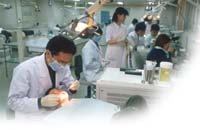


|
8. Educational evaluation system
The residents are required to participate in diagnosing, planning
treatments for, and treating an average of 80 new and transferred
patients with malocclusions, including congenital craniofacial anomalies.
We assess the orthodontic treatment results achieved by the residents
at the end of the course. Prior
to starting active treatment the residents must present each new
patient's case to the Faculty. The Faculty must accept the final
treatment plan, and the bay instructors must sign the plan. If the
patient is seen infrequently, the resident must inform the bay instructor
of the reasons. If there is a problem with patient cooperation in
terms of keeping appointments or using the orthodontic appliances,
the residents must contact their instructors immediately.
|
||||||
 |
||||||
| Previous | ||||||

1.
Admission to the postgraduate program
2.
The social background of postgraduate
training programs
3.
The criteria by which to judge whether admission
should be given for an applicant who wishes
to enter postgraduate training program
4.
Those who can take the course of
our postgraduate training program
5.
The ideal oral health experts whom the
Department aims at producing by
providing this postgraduate training program
6.
Standard textbooks
7.
Curricula
8.
Educational evaluation system